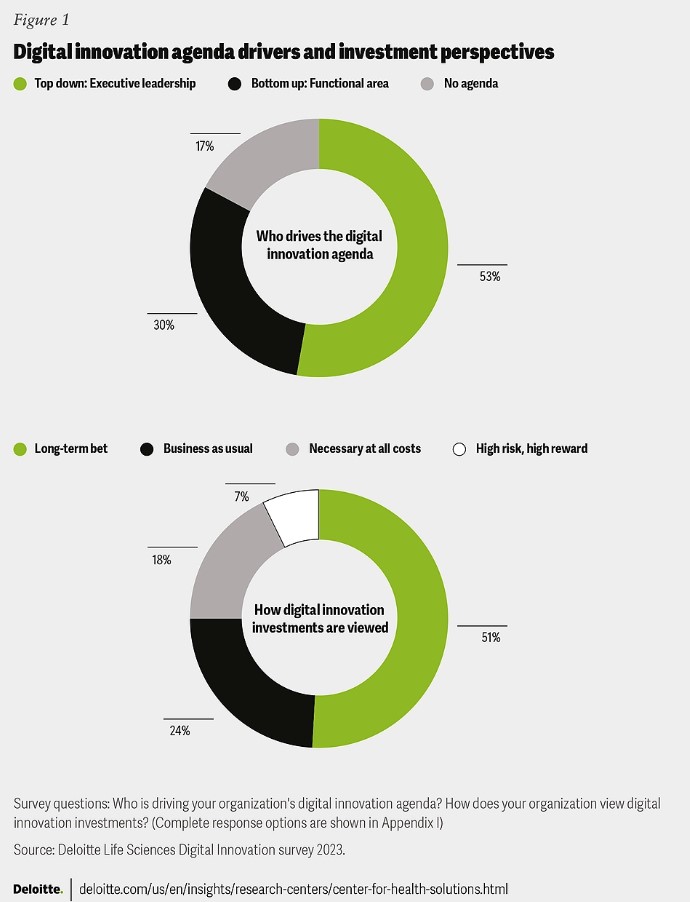Manufacturing has been the cornerstone of the medtech industry for years, renowned for its ability to produce high-precision equipment to meet clinical needs. However, shifting market dynamics, including cost pressures and evolving consumer demands, are compelling medtech companies to reevaluate their traditional approaches. In response, many are turning to digital technologies to innovate and maintain a competitive edge.
Leadership support and a clear roadmap are prerequisites of any successful digital transformation
A recent survey conducted by the Deloitte Centre for Health Solutions sheds light on how medtech companies are embracing digital transformation. The survey, which included 100 executives from large medtech firms across the globe, identified three key themes:
- Measuring digital innovation maturity: Assessing where companies stand in their digital journey and how they plan to progress.
- Modernising operations, products, and customer experiences: Exploring the impact of digital innovation when integrated into various business functions.
- Adopting digital business models: Examining strategies to leverage digital capabilities for growth.
Leadership support and a clear roadmap are crucial for successful digital transformation. While the survey revealed varying levels of commitment to digital innovation among medtech companies, the majority recognise its long-term significance. However, gaps in leadership alignment, funding, and strategy remain prevalent obstacles to achieving digital maturity. While 17% of the surveyed medtech leaders said their organizations lack a defined plan, 53% said they are guided by a strong, leadership-driven digital innovation agenda.
The majority of respondents highlighted several areas where their organisations lag behind in digital maturity compared to market leaders. Notably, the analysis revealed a strong correlation between leadership alignment and understanding the impact of digital innovation on the business, indicating that cohesive leadership is pivotal in recognising the specific benefits digital innovation can offer.
Leadership alignment emerges as the primary obstacle, cited by 65% of respondents, hindering medtech companies from attaining digital maturity. Additionally, funding (61%) and the need for a more robust digital innovation strategy (58%) were identified as significant gaps. Regarding talent, medtech leaders emphasised the necessity for experts proficient in data access and management. In terms of processes, there is a consensus among respondents that improvements are required within IT organisations to enhance digital innovation procedures.

Digital transformation brings impact to three main business functions
Medtechs are leveraging digital technologies to enhance operations across three identified functions: innovation & product development, manufacturing & supply chain, and marketing & commercial. Notably, there is a growing emphasis on digital therapeutics, smart factories, and omnichannel engagement. AI emerges as a dominant investment area (80%), followed closely by cloud technology (70%).
Looking ahead, medtech companies are focused on exploring how digital technologies can transform their businesses. Strategies range from collecting and analysing data to developing new digital products and services. However, there is a notable gap between intentions and actions, with only a fraction of companies (16%) contemplating more business-to-consumer (B2C) approaches in addition to the more traditional business-to-business (B2B) model. Another disconnect is visible in investment strategies for digital business models. Only 21% have made significant investments into growing other services: software as a service (SaaS), hardware as a service (HaaS), data as a service (DaaS), and subscriptions.
Deloitte’s recommendations for better digital technologies adoption and growing new business models
The respondents acknowledge that digital innovation is a long-term endeavour for their organisations, essential for staying competitive. Achieving success in this realm likely entails implementing a comprehensive strategy that encompasses all business functions and requires a commitment to investing time and resources. Various tactics can be mobilised by medtech leaders to drive the adoption of digital technologies throughout their organisations and to facilitate the growth of new business models:
Align on the business case and value proposition to customers. Portable and point-of-care technologies could introduce a paradigm shift that will impact directly the growth potential of the organisation.
Experiment with new business models. Pilot experiments should be conducted to identify new business models.
Modernise operating capabilities. Companies should adopt agile models with adaptable operating structures and should do so quickly.
Invest in new capabilities. New consumer insights should be gathered, and paired with new skillsets to design novel solutions flawlessly.
Ultimately, embracing digital innovation is essential for transforming traditional business models and ensuring long-term success in the medtech industry. By leveraging their clinical expertise and customer relationships, medtech companies can harness the power of digital technologies to drive growth, improve patient experiences, and lead the way in an evolving healthcare landscape.
Source & Image Credit: Deloitte



























